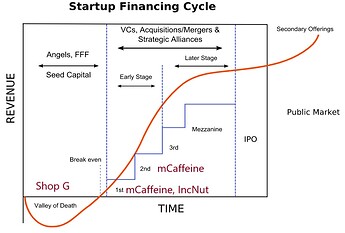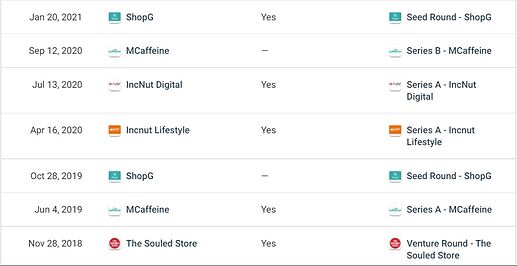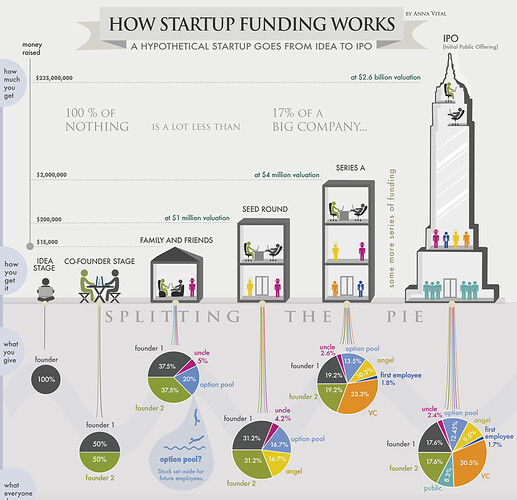The primary investment thesis for RPSG Ventures has to be the valuation gap between the current market cap and the FSL holdings, but I thought we can shed some more light on the startups currently held by the venture fund.
What are the different rounds of funding for a startup and where does RPSG fit in?
(Sourced from wikimedia commons)
A high percentage of startups fail at the seed round, and very few make it to the Series A stage. At this point, it’s worth noting that the majority of RPSG investments have been in Series A funding rounds. This means you’d expect all of these companies to have crossed break even.
In general, working capital from Series A would be used to hire more people and expand, and it lasts between 12-18 months before they start another round of funding.
-
mCaffeine is the only one so far to have gone on to Series B, 15 months after their Series A.
-
ShopG went through two rounds of seed funding, again lasting around 15 months. We should expect the next round of funding in April 2022.
-
It has been roughly a year since IncNut had their funding round, and we should expect to hear developments about this fairly soon.
-
The Souled Store is the outlier, looking to raise funding over two years after the last round.
-
Companies like Swiggy are at Series J, Nykaa was raised funding through Series F in March 2020.
-
The following snippet from the ongoing basecamp leads me to believe that they’re now taking on riskier startups at the seed stage. An objective benchmark is that 80% of these will fail, and it’s a clear monitorable to see how many of these go through to Series A in early 2023. (Almost like asset quality check for an NBFC). We can expect RPSG to have a 15-25% stake in companies that they seed fund.
How much stake does RPSG own in these companies?
I wrote to the investor relations, but haven’t received a response. Did some scuttlebutt with a friend who works at one of the largest VCs in the country. He thinks they aren’t obligated to disclose their stakes, and we shouldn’t value these companies based on the stake that RPSG owns as it gets diluted over time and valuations change very quickly with startups. However, it’s useful to have an overview of their portfolio.
Really nice infographic, sourced from Adioma.com
While it looks like we should expect VCs to have ~30% ownership, it depends on how many other investors participated in the series A funding rounds. A look at the funding rounds shows us that RPSG wasn’t the sole investor in a lot of these rounds. Amicus Capital lead the investments in mCaffeine’s series B. Crunchbase lists RPSG as the lead investor for five rounds.
Here’s the overview:
| Brand | RPSG Stake | Valuation | Revenue | Management’s Revenue Target | Data Validity | Shares held as of March 2020 |
|---|---|---|---|---|---|---|
| mCaffeine | 12.8% | 230.71 Cr. | ~100 Cr. | 500 Cr by FY24. | September 2020 | 6171 (Listed as Pep Technologies) |
| Souled Store | 1.5% | 146 Cr. | ~100 Cr. | 1000 Cr by FY25. | Revenue validity FY21, valuation November 2018 | 714 |
| IncNut Digital | 7.7% | 281 Cr. | ~50 Cr. | 250 Cr in FY22, 50% from SkinKraft, 500Cr from Vedix by FY26. | March 2020 | 16461 |
| Dr. Vaidya’s | 100% | 144 Cr. | 16.33 Cr. | New management | March 2020 | Complete ownership |
| Peelworks | Unknown | 255 Cr. (2020) | ~50 Cr. (2019) | Unknown - Scaling to 30 cities with 100,000 retailers | Valuation as of 2020, revenue as of 2019 | 4134 |
Source for the data is www.tracxn.com which looks to have a very large coverage universe. Shares held sourced from the FY20 annual report.
With IncNut, it’s a little more complicated as they have two entities: IncNut Digital which deals with StyleCraze, and IncNut Lifestyle, which owns Vedix and SkinKraft. It’s unclear how this is structured in terms of RPSG’s ownership.
Sharing some articles on all of these brands as my sources for management commentary:
Here’s an RPSG family crossover: the founder of Dr. Vaidya’s interviewing the mCaffeine head.
https://www.listennotes.com/podcasts/direct-to-a/episode-6-tarun-sharma-ViJdr_4auUy/
- On strategy/vision: Data is the centre of our vision, it is our God. If the data doesn’t support ideas that the co-founders have, we don’t implement it. Have a ten member team that looks at every single aspect of the business strategy.
- We split our target audience into different brackets. Model the complete primary customer, and run targeted advertising to make sure that this person sees the product everywhere through ten different mediums, whether they’re on facebook, or instagram. We box one customer ten times rather than have ten customers buy our products once. Different strategies for different brackets.
- We’ve come up with a system to quantify social media engagement, and through this have a score for each of our influencers that push the product. If content produced by one has a lower score, we spend time on this and aggresively pursue higher score advertising.
Incnut has two verticals: IncNut digital and IncNut lifestyle:
- Incnut Digital is an advertising / content platform that has a reach of 50 million women monthly, I found a presentation from 2019 that describes what they do media-kit-Bridalbox Media Deck 2019.pptx (4.8 MB)
Snippet of their clients:
- Incnut Lifestyle contains brands that have SKUs such as Vedix and SkinKraft, management expects 50% of their revenues to come from SkinKraft. SkinKraft currently generates over 1,00,000 orders a month, with the average ticket price being in the range of Rs 800-Rs 1,000.
Will update the tables once I have consistent sources that pin down revenue at a particular time.
Disclosure: Invested.





